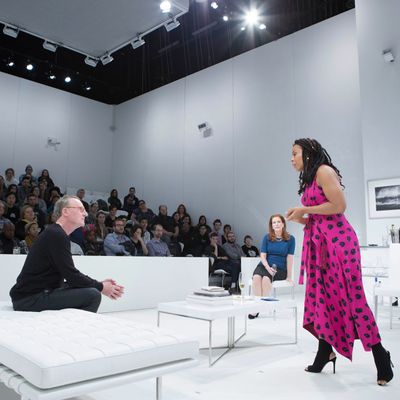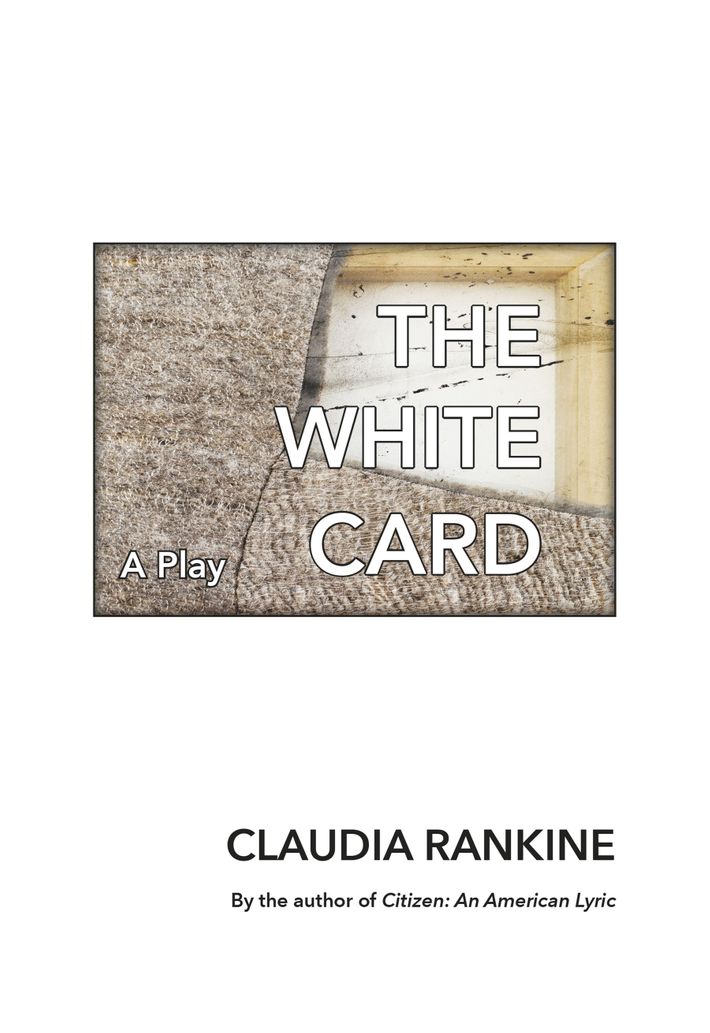
Claudia Rankine is one of todayÔÇÖs foremost writers on racism and the white imagination. Citizen: An American Lyric, a hybrid of poetry and essay, catapulted her to national prominence in 2014 (and became a bestseller).
Two years later, a MacArthur ÔÇ£geniusÔÇØ grant cited her for ÔÇ£crafting critical texts that are proving to be essential for understanding American life while also enriching the craft of poetry with a new sense of agency and urgency.ÔÇØ With the $625,000 prize money, she created The Racial Imaginary Institute, a cultural laboratory hosting symposiums, lectures, and writings that explore how race ÔÇö arbitrary as it may be ÔÇö has such an immense impact on all of our lives.
And now, Rankine is a playwright, too. Published last month, The White Card: A Play echoes many of CitizenÔÇÖs themes, subtly dramatizing the full spectrum of racism from micro-aggression to surveillance to death as spectacle. Charlotte, a black female artist and a star on the rise, is invited over to dinner one night by the white and wealthy collectors Charles and Virginia, who hope to buy some of her work. When the coupleÔÇÖs son Alex attacks the group for their timid politics, the conversation turns explosive. Rankine deftly crafts a story in which whiteness and blackness interact under the guise of good intentions, until power relations inevitably take center stage. Commissioned by ArtsEmerson and the American Repertory Theater, the play premiered a year ago in Boston, and will make its New York premier in June at the New York Public Library. Morgan Jerkins spoke recently with Rankine about white guilt, bad reviews, MoÔÇÖNique, and the dilemmas of the black artist.
In your preface to the play, you mention a white man asking you during a talk, ÔÇ£What can I do for you?ÔÇØ in order to mend race relations.┬áYou flipped the question back on him: ÔÇ£You should ask what can you do for yourself.ÔÇØ He didnÔÇÖt like that. Where do you think his offer of benevolence fell short?
The idea of white benevolence is based on their desire to share their good fortune, as in actual fortune. If youÔÇÖre not understanding how you came to that fortune, you really feel like youÔÇÖre doing other people a favor. I wanted to show that it comes from the place of wanting to help without admitting how you also contributed to the crippling of black Americans in this country.
What about reparations, which are being taken more seriously as a campaign issue? Is that an act of benevolence or something different ÔÇö justice?
ItÔÇÖs an act of justice. And one form of reparations can take is putting into place that which was willfully neglectedÔÇövoting rights, good schools, clean water, etc.
In the play, Virginia asks Eric, an art dealer who is also invited to dinner, ÔÇ£Is there anything we should know about Charlotte?ÔÇØ And Eric says, ÔÇ£No, no, no, sheÔÇÖs lovely. CharlotteÔÇÖs one of us.ÔÇØ It felt like tokenization, because sheÔÇÖs not one of them.
SheÔÇÖs already been screened by the powers that be. I was intentional with that. When he says that sheÔÇÖs one of us, you can depend on her being able to share your references. SheÔÇÖs had the education.
LetÔÇÖs talk about Alex, who goes on and on about protests and his brother being in prison ÔÇö but his parents donÔÇÖt care. I know he has the best of intentions, but then he calls out Charlotte, too, for not reacting in a certain way.
Right  his sense that theres only one kind of black [laughs] and he is the revolutionary. What hes doing, hes doing on her behalf and how dare she not support him? To me, Alex and his father are similar. They just sound different [laughs]  In the sons case, Charlotte needs to perform the rejection. In his dads case, Charlotte needs to be doing a certain kind of work. If you dont perform that, there will be no funds for you.
This demand for a performance reminds me of MoÔÇÖNique. Last year she said she was only offered $500,000 by Netflix for a comedy special, compared to millions for Chris Rock and Amy Schumer. A lot of black people asked her why she didnÔÇÖt negotiate, and she said that there was no negotiation. She decided to walk away to protect her integrity. Ever since then, she hasnÔÇÖt gotten any high-paying gigs.
Well I think thatÔÇÖs fantastic, what MoÔÇÖNique did. If she can afford to say that she is not a second-class citizen, I donÔÇÖt understand why one wouldnÔÇÖt support that. What people are saying by not supporting her is, ÔÇ£DonÔÇÖt you understand that black women are second class citizens? You should be grateful that you got this deal at all because we donÔÇÖt need you, we donÔÇÖt need to see you, and we certainly donÔÇÖt need to pay you.ÔÇØ
I thought about that, reading the play. At one point, Charles comes to CharlotteÔÇÖs studio, upset that she sold her work to someone else. But thatÔÇÖs her right!
Exactly. I donÔÇÖt understand the other black people who are telling MoÔÇÖNique that she shouldnÔÇÖt have done it. ItÔÇÖs almost as if they are admitting that their own presences are simply by the grace of white people.
The play starts with Charles, Eric, and Virginia watching the U.S. Open. Serena Williams is playing. YouÔÇÖve written about her in Citizen and The New York Times, and youÔÇÖve spoken about her to PBS. Why does Serena keep popping up in your work?
I love women who refuse invisibility in black femininity and who are insisting that we are worth whatever worth is out there. And Serena I especially love because she doesnÔÇÖt leave her emotions at home. She hasnÔÇÖt turned into a machine. The policing of Serena shows up again and again in my work because the amount of respect I have for that woman floods me. We see her in a sport dominated by white people and you hear the racism against her again and again and again. And yet, she keeps winning.
At the playÔÇÖs climax, Charles and Virginia unveil the autopsy report of Michael Brown, depicting a photograph of a diagram at dinner. It made me think of the consumption of black death in front of white audiences. Is it possible for white people not to feel guilty whenever they read about the racism that black people experience?
WeÔÇÖve seen the tolerance of [black trauma] for 400 years. All of those dead black bodies all over the media and everyone just went on doing what they were doing. In terms of entertainment and art, there is the sense that the portrayal of this is valuable ÔÇö and literally valuable. You canÔÇÖt separate this commodity and supply-and-demand world that we are in. So when the artist goes there, they are going there because the public demands it. So then the question is, What is being bought, given, made, and sold? ItÔÇÖs a question that IÔÇÖve had for myself. IÔÇÖve given talks, and my own films [collaborations with her husband, John Lucas] have shown the killings. I thought it was important to show those moments, like: As youÔÇÖre getting your latte, this is whatÔÇÖs happening. I was at the Art Institute at Chicago and my students were like, ÔÇ£We donÔÇÖt want to see that. We donÔÇÖt want to see black people treated that way,ÔÇØ and I felt like I needed to hear that. It was me in many ways talking to myself about my own art production. What am I putting out there and why am I putting it out there? And for whom?
How did it feel to see the play on stage?
It was an incredible experience. ItÔÇÖs very helpful to hear [actors] negotiate the language and it really helped in the editing process to know what could sit in their mouths and in their bodies. One of the harder characters to cast was Eric. A lot of the actors felt like the white people werenÔÇÖt given a fair shift in this particular play. In places like the Boston Globe, white male reviewers thought it was unfair.┬áI remember once being in the theater where there was a white couple ÔÇö they said to me that they almost didnÔÇÖt come because the reviews were so bad. But then their friends told them they had to come and they were glad that they did. Reviews have a lot of power. ItÔÇÖs sad that the Boston Globe sent somebody who was so defended and defensive into the space of the play.
How did you deal with that?
I expect that. IÔÇÖm just showing you what I see, you know? I spoke to a lot of visual artists and asked them to tell me the kinds of things that have been said to them. They dealt with these white collectors. And yet people say, ÔÇ£Well, nobody would say that.ÔÇØ But I didnÔÇÖt make it up.


